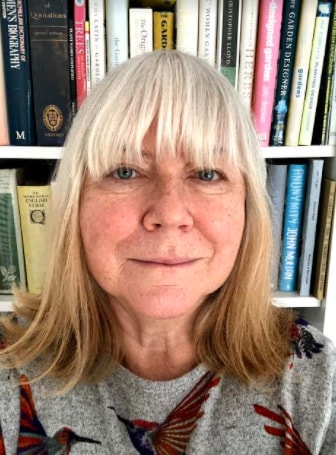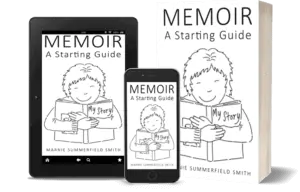I opened the parcel and took out the book. I held it. I stroked the cover. I turned the pages, one by one. I sat silently, feeling the weight of it.

My memoir.
It was the first time I’d completed any creative writing, though I’ve started several novels. It represented a huge part of my life that has profoundly affected me – but not defined me – ever since. And it felt like a huge achievement to have dredged through my first 19 years in this world and made some sense of it.
It was September 2019 when Marnie Summerfield-Smith breezed into my creative writing class to tutor us for a term. We were all new to memoir writing and a little trepidatious about what we were opening ourselves up to.
From the start, each of us was grappling with several big questions. Why am I writing this? Who is it for? And, fundamentally, what is the story I want to tell?
Then there was the how. The structure, format, length, style and tone.
It was so helpful and important to have people to discuss all of this with. I don’t think I’d have written (and certainly not finished) my memoir without this group of women.
I’d had a complicated and often troubled childhood but I didn’t want to write a misery memoir. I had loving parents and relatives. I was encouraged to take education seriously. I didn’t go without food or clothes.
But I wanted to delve into the formative years of being part of an unstable, fractured family, forced to live with my mum’s mental illness, worrying about my dad’s drinking and wondering where I belonged in the world.
Now I was confronted with the fact that my strongest memories are of some of the worst events and my recall of the normal, everyday times is sketchy. In recent conversations with my brother and school friends I realised that we each have different takes on the same events and also remember very different experiences. So how could I write a truthful memoir? And how could I write it if I couldn’t remember exact conversations?
In the writing group we thrashed out these questions and more. We concluded that what was important was the overall truth of each experience and the impact it had on us. We also felt it was alright to take poetic license with dialogue, as long as the language and tone were true to the people involved.
So where to start? I had to decide if I wanted to tell a linear story, present a series of scenes or jump back and forwards in time. I could have easily got side-tracked by the planning, so in the end I felt I just had to start writing, anywhere, and worry about the shape of the narrative later on.
That was clearly the right decision for me because the words started to pour out and memories began to emerge. Until I reached the first painful scene. I felt panicky and had to stop typing. I found I couldn’t stop crying. It was too upsetting to continue.
I took a break and let the emotions settle a bit. Then I forced myself to go back to the writing.
And so it went on for several months. Stopping and starting. Writing and deleting. It became obsessive. And I began to resent having to live in the past so much. But the words and pages built up and suddenly I had written more than I’d ever achieved before.
In our group, we took it in turns to read out a section of our memoir and get feedback from each other. It was profound and moving. In some cases – certainly in mine – we were sharing things we’d never told anyone else. It was also funny and life-affirming. Sometimes we cried. Often we laughed. It was invaluable.
What I also found difficult in writing the memoir was how much to say or keep back about other people. I was anxious not to hurt or upset anyone but at the same time I wanted to be as honest as I could. Again, discussions with my writer friends helped me see how I could draw the line and advised where I may have crossed it.
In April 2020, I’d completed a first draft. I was thrilled and relieved and exhausted. A school friend who’s a novelist offered to give her critique. This was the first time I had shared any of my creative writing with anyone outside my group, and I was extremely nervous about it, particularly as she had been a big part of my teenage years. She loved it, and that boosted my confidence enormously. Her honesty and positive suggestions really helped – one key comment she made was that the strongest chapters were those which started with a scene written in the present tense, with dialogue. I agreed, and re-wrote a few chapters to reflect this.
By the time I’d finished the second draft, I felt emotionally drained and wanted to forget about the whole thing. In August, I handed it over to Marnie for editing, nervous about her response. I needn’t have been. She was overwhelmingly positive and suggested some very good changes. This gave me the impetus to finally complete the memoir and in November, I handed it over for formatting and printing.
I had planned to publish my memoir but three factors made me change my mind. First, my brother is a very private person and it felt wrong to expose his childhood to public scrutiny. Second, my aunt, who was a huge presence in my teenage years in particular, is still alive and might feel upset by some of my account. And third, the idea of it being out there with a life of its own suddenly panicked me.
At first I was disappointed. But I’ve come to realise that first and foremost, I wrote it for myself and I’m very proud of it. When I complete my first novel I will be desperate to publish it but this memoir is too personal.
I have shared it with my school friends and feel overwhelmed by their positive reactions about my writing and storytelling. But what is amazing is how little any of them knew about what was going on in my life and how sad they feel about it.
I knew I hadn’t told them very much when we were at school. Perhaps I wanted to seem normal; or couldn’t find the words or the meaning to convey it; or maybe we were just typical teens, absorbed in our own lives; or possibly it was because people then shared less private stuff than they do now.
I believe we’ve all got hidden stories. Writing my memoir forced me to delve and dig, to overcome fear and to keep putting the words on the page. It’s been a difficult but rewarding journey but I’m so glad I wrote it. I now feel encouraged and inspired to get on with my novel. And finish it.
